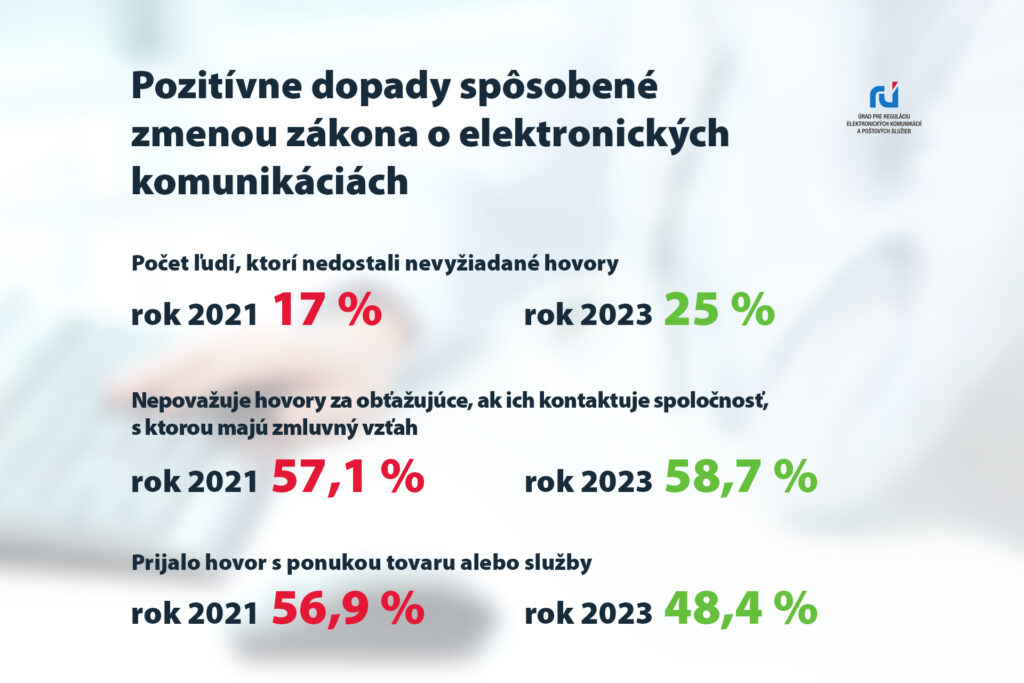Slovaks perceive a decrease in unsolicited calls, it is also due to the change in the telecommunications law
Back to the listIt has been more than a year and a half since significant changes were made to the Electronic Communications Act which have a direct impact on the practice of “unsolicited calls”.
Compared to 2021, people generally perceive a reduced number of unsolicited calls.
This is according to a survey by CreditCall and Neuropea, which focused on analysing the impact of the telecoms law change on the number of unsolicited calls and the overall market environment.
The results of the benchmarking survey were presented by CreditCall along with a representative from the Office of Electronic Communications and Postal Regulation at a press briefing on Wednesday, March 13, 2024.
The survey compares how the perception of unsolicited calls has changed among ordinary citizens before and after the change in the telecommunications law. The first survey was conducted in August 2021 and the second in November 2023 with a sample of 1,000 respondents. The results provide a deeper insight into how the changes have been reflected in actual numbers and trends, and how they are impacting both consumers and telecom service providers.

The number of calls to sell a good or service has fallen
While in 2021 up to 56.9% of the Slovak population claimed to receive a phone call offering a good or service, in 2023 this number dropped to 48.4% of people. The survey also shows that the number of unsolicited calls has decreased. In 2021, 17% of people do not receive a phone call, in 2023 this figure is almost 25%. This decline can be linked to two changes.

“At CreditCall, we see the regulation by the change in the new telecommunications law as a positive development. We did not make unsolicited calls even before the change. We have only implemented the activities of our principals’ existing clients,” said CreditCall director Juraj Balogh, adding, “What we see as positive is how ordinary people perceive active telephony.”
On the one hand, there has been a change in the telecommunications law, which has significantly regulated the number of unsolicited calls. At the same time, in 2021 there was still a pandemic period and people got used to making more phone calls and meeting less. This is also reflected in the behaviour of companies, which has changed over the years, and there are fewer phone calls.
Position of the Office for Electronic Communications and Postal Regulation
The decrease in the percentage of unsolicited calls may also be due to innovations introduced by the Office of Electronic Communications and Postal Services Regulation (the Office) in the second half of 2022.
Under the Electronic Communications Act all those who market to the public via telephone with an offer of goods or services must use the marketing area code (0) 888 from August 2022. Thus, if a customer who is contacted sees the three-digit (0) 888 on the display of his/her phone, he/she immediately knows that it is a marketing call and decides whether or not to accept the call.
2 months later, in November 2022, the office created a state registry to prevent unsolicited marketing calls on the web at www.nevyziadanevolania.sk. Anyone can register their mobile or landline number here for free and prevent all marketing calls to their number or just select specific areas they do not want to be contacted with offers over the phone.
“By regulating unsolicited calls, we have contributed to ensuring that all telemarketers respect the will of the customer, whether or not they want to accept a marketing offer or service over the phone,” said Ivan Martyák, Director of the Department of Electronic Communications Regulation, adding: “All operators must verify the registered telephone numbers in the list for the prevention of unsolicited marketing calls before making a call, and if the number is not on the list, they must use the marketing area code (0) 888. If they fail to comply with these legal rules, they risk being fined.”
People are less bothered by phone calls to companies they have a contract with
In terms of whether people are bothered by these calls, there are only minimal differences between the observation periods. If the calls are unsolicited, they are very disturbing or rather disturbing to people in 64.3% of the cases . „Tento pocit sa však mení v prípade, že ich kontaktuje banka, poisťovňa, lízingová spoločnosť, telekomunikačný operátor, poskytovateľ energií alebo plynu s ponukou ich služieb. Vnímame to aj my, pretože sa stretávame pri telefonovaniach existujúcim klientom s lepšou odozvou,“ approaches Balogh. This is also confirmed by the survey, as calls from companies with which they have a contract do not bother them at all, or rather 58.7% of people do not mind, i.e. almost exactly the opposite proportion as when it comes to unsolicited calls.
Comparing the different sectors, which are bank, insurance, telecom operator and energy, the perception of contacting people from the companies they are clients or customers of has generally decreased slightly compared to 2021. People are least bothered by being contacted by a bank at almost 59%, followed by an energy company at 57.5% and the worst perceived contact from an insurance company at 46.3%.
What impact has the change to the telecoms law had
The above survey shows that in general people perceive a reduced number of unsolicited calls. The difference is 8.5%. It is therefore evident that the change in the telecommunications law has significantly regulated the number of unsolicited calls. At the same time, the survey shows that when unsolicited calls are made, 64.3% of people consider these calls to be nuisance calls. This changes when people receive a call from a company with which they have a contractual relationship – in this case the proportion changes and 58.7% of people do not find these calls annoying. “We at CreditCall have long argued that it is important to communicate with our clients, including over the phone, and our survey proves this,” concludes Juraj Balogh.